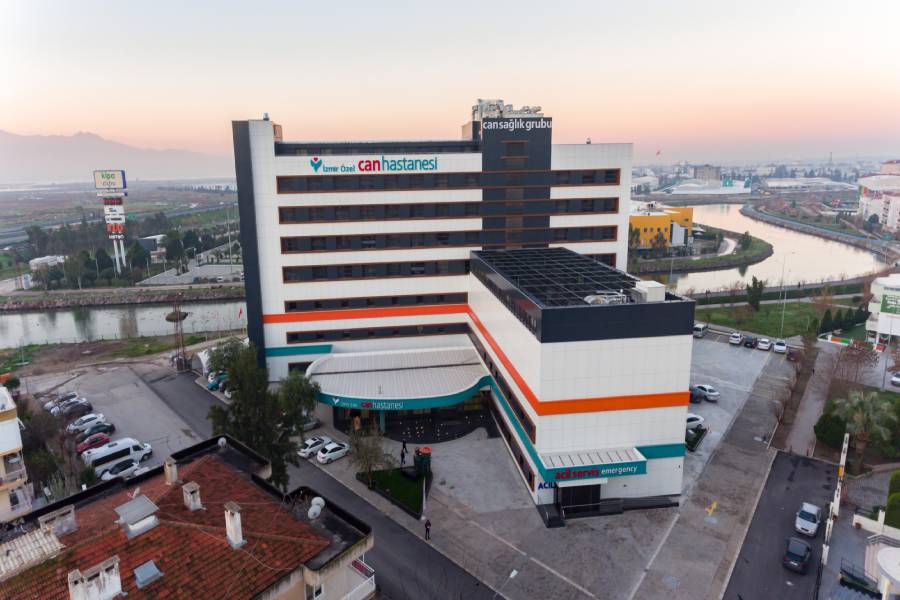Hip Replacement Surgery: What to Expect During Your Hospital Stay
Categorised in: HEALTH GUIDE, Genel
Published Date:
Table of Contents
Undergoing hip replacement surgery can be a life-changing experience, offering relief from chronic pain and improved mobility. At Can Hospital in Izmir, Turkey, our dedicated team of orthopaedic surgeons and healthcare professionals strive to provide the highest quality of care throughout your hospital stay. This guide will walk you through the various aspects of your hip replacement surgery journey. We will cover pre-operative preparations, the surgical procedure, post-operative care, and the road to recovery.
Understanding what to expect during your hospital stay can help alleviate anxiety and ensure a smooth and successful recovery process. We will delve into the details of pain management, physical therapy, and the steps you can take to prevent complications and promote optimal healing. Additionally, we will discuss the benefits and considerations of undergoing hip replacement surgery at Can Hospital in Izmir, Turkey. We will also provide insights into the long-term outlook for patients following this transformative procedure.
Preparing for Your Hip Replacement Surgery
Before hip replacement surgery, patients must take crucial steps to prepare. The process starts with a detailed medical evaluation. This checks the patient’s health and if they’re ready for surgery. It includes a physical check-up, blood tests, and imaging like X-rays or MRI scans.
During the evaluation, discussing medications with the surgeon and anaesthetist is vital. Some drugs, like blood thinners, might need to be changed or stopped before surgery. It’s important to list all medications, including over-the-counter and herbal supplements, to guide the medical team.
Patients will also talk about anaesthesia options. General anaesthesia is common for hip replacement, making the patient unconscious. But, regional anaesthesia might be used with sedation in some cases. The anaesthetist will discuss the pros and cons of each to find the best choice for the patient.
Preparing for hospital admission and recovery is also essential. Patients should arrange transport, prepare meals, and make their home safe and accessible. They might need help with daily tasks like bathing and dressing during recovery.
Thorough preparation for hip replacement surgery is crucial for a smooth hospital stay and successful recovery. Keeping open communication with the medical team and following pre-operative instructions are key. This helps reduce risks and ensures the best outcome.
Hip Replacement Surgery Story; Serpil From Turkey
The Day of Your Hip Replacement Surgery
On the day of your hip replacement surgery, you’ll arrive at the hospital early. The nursing staff will help you with the pre-operative procedures. This includes changing into a hospital gown and taking any necessary medications. Your surgical team will discuss the procedure with you, addressing any concerns or questions.
Before entering the operating room, you’ll receive anaesthesia. This ensures you’re comfortable and pain-free during the surgery. The type of anaesthesia depends on your needs, with general anaesthesia being common. This means you’ll be unconscious throughout the procedure.
Under anaesthesia, your team will start the hip replacement procedure. They’ll make an incision over your hip joint and remove damaged cartilage and bone. Then, they’ll prepare the bone surfaces for the implant. The artificial hip, made of metal and designed to mimic a healthy joint, will be positioned and secured.
During the surgery, your team will monitor your vital signs. The operation typically lasts between one to three hours. This time varies based on the complexity of your case and the surgeon’s technique.
Once the implant is in place, your surgeon will close the incision. You’ll then be moved to the recovery room. Here, you’ll be monitored as you wake up from the anaesthesia. The nursing staff will manage your pain, ensuring your comfort as you start your recovery journey.
Immediate Post-operative Care
After your hip replacement surgery, you’ll be moved to the recovery room. Here, the medical team will closely monitor you. They focus on your safety, pain management, and preventing complications. The nursing staff will check your vital signs regularly, like blood pressure and heart rate, to ensure you’re recovering well.
Pain management is a key priority in the recovery room. Your surgeon and anaesthetist will create a pain plan tailored to you. This might include oral medications, injections, or PCA. The aim is to keep you comfortable and start your rehabilitation quickly.
To avoid blood clots, several measures will be taken. These include compression stockings, pneumatic compression devices, and blood-thinning drugs. You’ll also do exercises like ankle pumps to boost circulation and lower clot risk.
Early mobilisation is vital in your care. As soon as you can, a physical therapist will help you with exercises. You’ll learn to sit, stand, and walk with your new hip. This early movement helps prevent complications and aids in a successful recovery.
In the recovery room, you’ll receive detailed care instructions. These cover how to look after your surgical site, manage pain, and perform daily tasks safely. It’s crucial to follow these instructions and ask any questions to ensure a smooth recovery.
Pain Management and Medications
Effective pain management is key for a comfortable recovery after hip replacement surgery. Your healthcare team will create a personalised pain relief plan for you. This plan may include medications and non-pharmacological techniques to manage pain and aid healing.
Medications like opioids and NSAIDs are often prescribed for pain relief. Opioids, such as oxycodone or hydrocodone, are effective for moderate to severe pain. NSAIDs, like ibuprofen or naproxen, help with mild to moderate pain and reduce inflammation. Your doctor will monitor your medication use and adjust it as needed to control pain while avoiding side effects.
Non-pharmacological techniques are also part of your pain management plan. Applying ice packs to the surgical site can reduce swelling and numb pain. Relaxation techniques, such as deep breathing or meditation, can help reduce stress and promote relaxation. Positioning aids, like pillows or wedges, can support the affected leg and alleviate discomfort.
It’s crucial to communicate openly with your healthcare team about your pain levels. They may use a pain scale to assess your pain intensity and adjust your treatment plan. Remember, some pain after surgery is normal, but it should be manageable and improve as you recover.
If you experience any adverse side effects from your medications or have concerns about your pain management plan, inform your healthcare team promptly. They will work with you to find the most suitable approach to control your pain, support your recovery, and help you achieve the best possible outcomes after your hip replacement surgery.
Physical Therapy and Rehabilitation
Physical therapy is crucial for recovery after hip replacement surgery. It helps patients regain mobility, strength, and range of motion. The rehabilitation programme starts within 24 hours of surgery and continues post-hospital stay.
Initially, patients work with a physiotherapist on exercises to improve flexibility and prevent stiffness. These may include leg lifts, ankle rotations, and gluteal contractions. As they progress, they move to more challenging exercises to strengthen hip muscles.
Physical therapy also involves learning proper techniques for daily activities. Patients learn how to use walking aids for support and balance. As they gain strength, they gradually stop using these aids.
Physiotherapists monitor progress and adjust the exercise programme as needed. They ensure patients perform exercises correctly for safety and effectiveness. Continuing exercises at home is vital to maintain mobility and prevent complications.
Regular physical therapy and a home exercise programme are key to optimal recovery. By following the rehabilitation plan and working with their physiotherapist, patients can regain strength and mobility. They can then return to their daily activities with confidence.
Wound Care and Preventing Complications
Proper incision care is vital for avoiding infection and aiding in healing post-hip replacement surgery. Your healthcare team will give you detailed guidance on wound cleaning and care. It’s crucial to maintain the incision area’s cleanliness and dryness. Any redness, swelling, or discharge should be reported to your doctor without delay.
Infection prevention is a priority during your recovery. Alongside incision care, antibiotics may be prescribed to lower infection risk. It’s important to adhere to the antibiotic regimen and complete it, even if you start feeling better. Recognising signs of complications, such as fever, chills, or increased pain, is also key. If you notice these symptoms, contact your healthcare provider immediately.
Blood clot prevention is another critical aspect of your recovery. Your doctor might prescribe blood-thinning medications to reduce clot risk. Wearing compression stockings and doing ankle pump exercises can also enhance circulation and prevent clot formation.
Regular follow-up appointments with your surgeon and healthcare team are crucial. These sessions enable your doctor to monitor your wound healing, check for infection or complications, and adjust your treatment plan if necessary. It’s essential to keep all scheduled appointments and discuss any issues or questions with your medical team.
Hip Replacement Surgery in Turkey: Benefits and Considerations
Turkey has become a leading destination for medical tourism, especially for hip replacement surgery. It boasts a wealth of experienced surgeons working in state-of-the-art facilities. This offers patients exceptional care at a fraction of the cost seen in many other countries. Can Hospital in Izmir is a top choice for those looking to have hip replacement surgery abroad. It combines expertise, advanced technology, and a patient-centric approach.
Choosing Can Hospital for hip replacement surgery means benefiting from the expertise of its medical team. The hospital’s orthopaedic surgeons are highly trained and experienced. They use the latest techniques and technologies to ensure optimal outcomes. Patients can trust in the knowledge and skill of their surgeon, as well as the dedicated support staff who provide comprehensive care throughout the treatment process.
Can Hospital also offers state-of-the-art facilities equipped with advanced medical technologies. From diagnostic imaging to surgical suites and rehabilitation centres, the hospital provides a modern and comfortable environment conducive to healing and recovery. Patients benefit from the latest advancements in hip replacement techniques, such as minimally invasive procedures that reduce pain, scarring, and recovery time.
Another significant advantage of undergoing hip replacement surgery at Can Hospital is the cost savings. Turkey’s lower cost of living and favourable exchange rates allow the hospital to offer high-quality medical services at more affordable prices. Patients can save a substantial amount on their treatment without compromising on the quality of care they receive, making it an attractive option for those seeking cost-effective solutions for their hip replacement needs.
Can Hospital also understands the unique needs of international patients and provides comprehensive support to ensure a smooth and stress-free experience. The hospital’s international patient department assists with travel arrangements, including transportation, accommodation, and visa requirements. They also offer language support, with interpreters available to facilitate communication between patients and medical staff, ensuring that all concerns and questions are addressed effectively.
Additionally, patients should factor in the time required for travel and recovery when planning their hip replacement surgery in Turkey. While the hospital provides support for travel arrangements, patients should allow adequate time for pre-operative consultations, the surgery itself, and post-operative rehabilitation. It is crucial to follow the surgeon’s instructions and attend all follow-up appointments to ensure a successful recovery and the best possible outcome.
In conclusion, hip replacement surgery in Turkey, particularly at Can Hospital in Izmir, offers numerous benefits for patients seeking high-quality, affordable medical care. With its team of experienced surgeons, state-of-the-art facilities, and dedication to patient satisfaction, Can Hospital provides a compelling option for those considering medical tourism for their hip replacement needs. By carefully weighing the benefits and considerations, patients can make an informed decision and take the first step towards a pain-free, more mobile life.
Life After Hip Replacement Surgery: Long-term Outlook
After hip replacement surgery, patients embark on a journey of recovery. They will gradually regain strength and mobility. Most people return to normal activities within 3 to 6 months. However, it can take up to a year for full recovery.
The benefits of hip replacement surgery are long-lasting. Patients experience reduced pain, improved joint function, and a better quality of life. These improvements significantly enhance their overall well-being.
To ensure the longevity of the new hip joint, patients must make lifestyle changes. They should follow any activity restrictions advised by their surgeon. Low-impact exercises like walking, swimming, and cycling are safe and beneficial. They help maintain joint flexibility and muscle strength. However, high-impact activities such as running or contact sports should be avoided. These can cause excessive wear on the prosthetic joint, leading to potential complications.
Regular follow-up visits with the orthopaedic surgeon are essential. These visits help monitor the success of the hip replacement over time. Annual check-ups include physical examinations and X-rays. They assess the condition of the prosthetic joint and surrounding bone.
By working closely with their healthcare team and adopting a proactive approach to recovery, patients can enjoy the long-term benefits of hip replacement surgery. They can maintain an active, fulfilling lifestyle for many years.

Why British Citizens Choose Turkey for Health Services?
British citizens are increasingly opting for Turkey when seeking medical treatments due to a combination of superior healthcare services, affordability, […]

Psychological Effects of Genital Aesthetics on Body Image
In a society increasingly focused on physical perfection, the realm of genital aesthetics has surfaced as an area of both […]

Common Concerns About Genital Plastic Surgery
Genital plastic surgery, a burgeoning field within the realm of cosmetic enhancements, has witnessed a notable surge in popularity. Procedures […]

In which cases is labiaplasty necessary?
Labiaplasty, a procedure that has recently garnered significant attention, involves the surgical reduction of the labia minora. This operation, also […]

Healthy Recovery Process After Genital Aesthetic Surgery
Day Things To Do Things to Avoid 1-7 Days – Bed rest – Using medications recommended by the doctor – […]